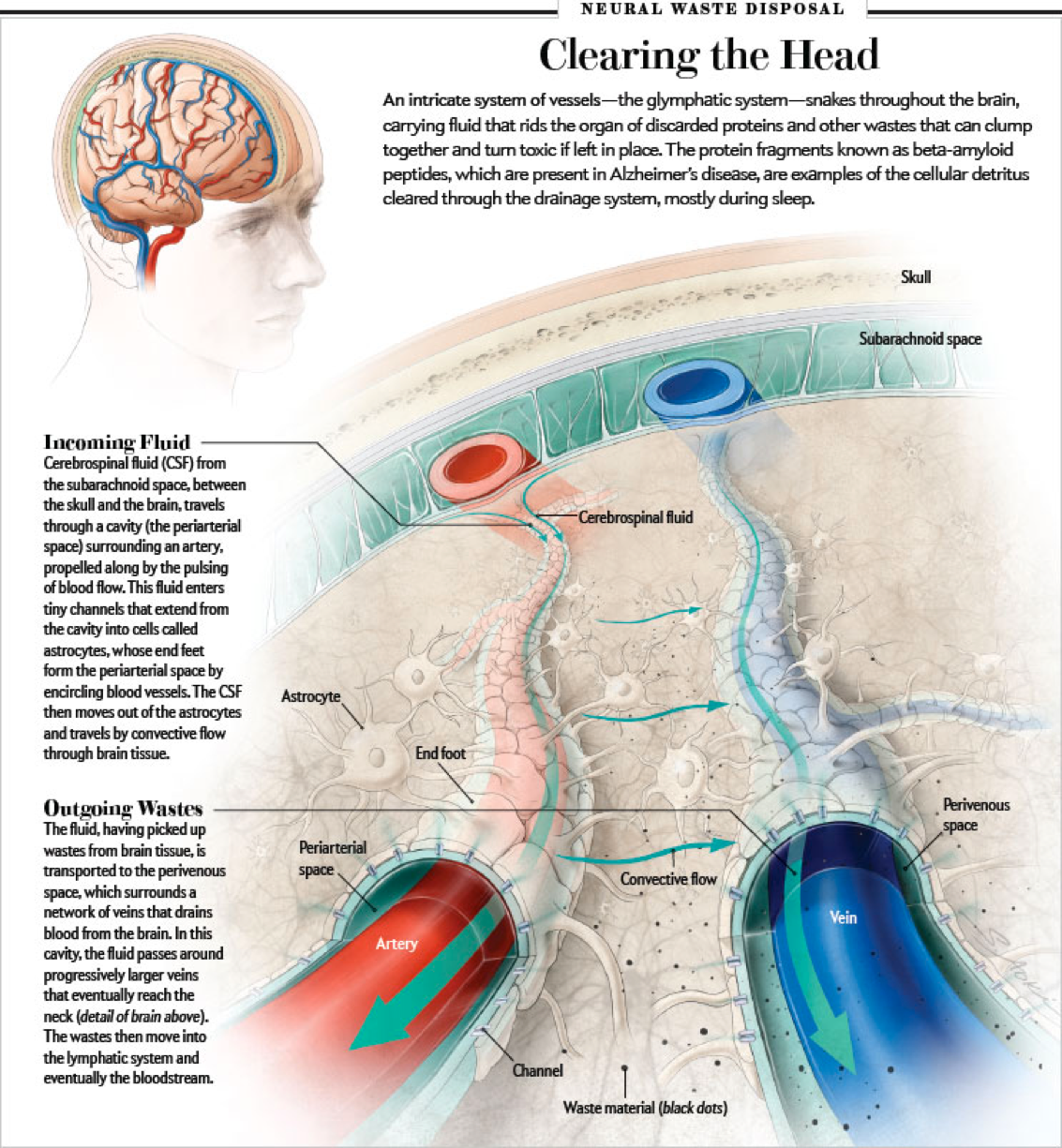
The discovery of the Glymphatic System a few years ago was met with significant fanfare, and rightly so – the story is one of clever researchers asking good questions, doing intricate science and reporting findings that had important clinical implications.
In this nicely titled (and open access) feature for Scientific American, two of the key researchers provide a very accessible summary of the discovery process, mechanics of the glymphatic system, clinical considerations and future research directions.
The human brain weighs only about three pounds, or roughly 2 percent of the average adult body mass. Yet its cells consume 20 to 25 percent of the body’s total energy. In the process, inordinate amounts of potentially toxic protein wastes and biological debris are generated. Each day, the adult brain eliminates a quarter of an ounce of worn-out proteins that must be replaced with newly made ones, a figure that translates into the replacement of half a pound of detritus a month and three pounds, the brain’s own weight, over the course of a year.
In our research, we found an undiscovered system for clearing proteins and other wastes from the brain—and learned that this system is most active during sleep. The need to remove potentially toxic wastes from the brain may, in fact, help explain the mystery of why we sleep and hence retreat from wakefulness for a third of our lives. We fully expect that an understanding of what happens when this system malfunctions will lead us to both new diagnostic techniques and treatments for a host of neurological illnesses.
“Sleep, those little slices of death — how I loathe them”
– Edgar Allan Poe
Fellow night owls will understand Poe’s words – so much to do, so much to read, and so little time – but the relationship between efficient glymphatic drainage and sleep is sobering reading:
The power of sleep
Having demonstrated that the expansion and contraction of the interstitial space during sleep were important to both brain function and protein-waste clearance, we then wanted to test a corollary to this observation: Could sleep deprivation precipitate neurodegenerative disease? Experiments that we conducted in mice showed that during sleep, the glymphatic system did indeed remove beta-amyloid from the brain with remarkable efficiency: its clearance rate more than doubled with sleep. On the other hand, mice genetically engineered so that they lacked aquaporin-4 water channels in astrocytes demonstrated markedly impaired glymphatic function, clearing 40 percent less beta-amyloid than control animals.
So have a read of the article and get a bit more up to date on the brain, but don’t lose any sleep over it.
-Tim Cocks


Tim,
I linked this excellent piece to my latest blog. I’m wondering what you think of dreaming?
Barrett
Hi Barrett
Thanks for your kind words.
If the Predictive Processing accounts of mentality are correct, then dreaming might be a by-product of the brain reducing complexity and redundancy in the generative models that it constructs during waking – interesting paper from Hobson and Friston on the topic: https://www.ncbi.nlm.nih.gov/pmc/articles/PMC3389346/
I quite like the idea that as the glymphatic system is taking out the garbage, the brain is also pruning synapses and cleaning up models of the world.
My best
Tim
This is a great nugget to share with patients to encourage them to seek better sleep health and hygiene. I presume the system works better as well in meditative and relaxing states as well. I can see the story starting ” we all get a lot of shit on our brains and it’s good to get rid of it. One of the best ways to do this is to……….
Thanks Tim
David
Thanks Dave.
It’s certainly made me rethink (again) the importance of sleep and question my own sleep habits!
Not sure on the meditation and relaxation thing – researching the piece it seems that there is something special about the unconscious sleep state and glymphatics. Unfortunately there are already those claiming to teach people to ‘detox their brain and hack their brain drainage system’ with various meditation/diet/supplement techniques so I reckon it’s safest to stick with good sleep advice. Meditative practices certainly have their benefits, but in this case they may not be a replacement for a solid 6-8 hours of zzzzs.
Tim
Will add a little anecdote to this thread (yes, I’ve read this can be risky to our sciencing): word is that the Dalai Lama sleeps 8 hours a night. Should imagine he meditates a little 🙂